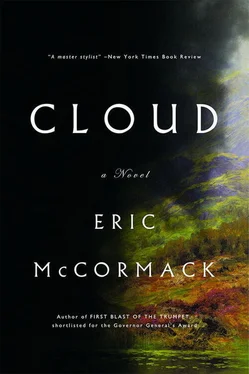The voice’s source had been in the library’s other cabin. She now came towards me and shook my hand. She was a short, elderly woman in a flowery dress, her hair short and grey, her face rather serious.
“I’m Mrs. Pradhan, the ship’s librarian,” she said. “So you’ve been having a good look round?”
THAT WAS MY FIRST of many meetings with the librarian of the Charybdis . She was a Londoner and the wife of the first mate, whom she’d met at the Mercantile Law Ministry in London when she was a research assistant there. He’d come to do some work on an impending inquiry and had asked for her help.
“Love at first sight,” she told me.
After their marriage, she sailed with him on all his ships and voluntarily looked after their libraries, which were usually in a state of utter neglect. “My labours of love,” she called her work.
IN MY SUBSEQUENT visits to the library, she grilled me about my life. She was a sympathetic listener and, of course, before long I’d told her my whole story. She was especially fascinated by what she called my “tragic love affair” with Miriam Galt and would ask me to repeat the details of it over and over.
“Talking about it will make you feel better,” she’d say.
In my view, if just talking about a broken heart made the sufferer feel better, it obviously wasn’t all that serious a blow in the first place. But I didn’t tell Mrs. Pradhan that. To keep her happy, I did talk about those days in Duncairn as often as she wished.
“How sad,” she’d say. “But how wonderful!”
By then I’d discovered that she was the one who’d acquired the collection of popular romances for the Charybdis , two years before. They were so noticeably water-damaged because they’d been on a ship that had run aground on a dangerous shoal off Plymouth. A major part of the cargo had been books headed for bookstores abroad. A salvage company had subsequently retrieved whatever it could and auctioned them off by the hundredweight.
“The boxes of love stories were the cheapest,” said Mrs. Pradhan. “I thought they might be especially good for lonely men at sea and help preserve their idealism about love. Don’t you agree?”
To be polite, I did agree. But as far as I could tell from listening to their tales about the various brothels they’d visited, my shipmates were anything but idealistic about love. Nor did I ever see any of them reading her romances, or much else for that matter — aside from the comic books and erotic magazines they’d brought aboard with them.
HER HUSBAND, First Mate Srinivas Pradhan, seemed about the same age as his wife. He was a small, dapper man from Calcutta, with silver hair slicked back. He was always impeccably dressed, unlike many of his fellow officers, who looked more at home in dungarees.
Because I’d become his wife’s favourite client, I was invited on several occasions to either dinner or high tea with them in their cabin. Mrs. Pradhan herself would prepare the meals in the ship’s galley, then bring them to the cabin where a formal table was set up with tablecloth, napkins, wine glasses, and silver cutlery.
The food was always extremely bland, out of regard for the first mate’s stomach. He’d been diagnosed as having a stomach ulcer, which he attributed entirely to the stresses of his job. He often reminisced about the delightful spicy foods of his youth, but his stomach could no longer stand them. Now he was condemned to boiled rice, liver cooked in milk, and custard pudding. His wine glass was used only for water.
So I much preferred it when they asked me to high tea. Then the food was much more palatable, with jam sandwiches and apple tarts specially baked by Mrs. Pradhan.
At all these meals, she would wear her floral dress and the first mate would put on his best uniform. I’d change into a fresh shirt and make sure I shaved. In the stifling heat of the cabin, we’d talk about this and that in the most civilized way, as though we were in some vicarage in the southern counties of England and not sweating it out on a dirty freighter in the southern ocean.
AS I GOT TO KNOW the Pradhans better, I could see how important his ulcer was in both their lives.
“How does it feel, Srinivas, dear?” Mrs. Pradhan would ask her husband if he was noticeably quiet during dinner or high tea. He didn’t need more encouragement than that to launch into a description of his ulcer’s fluctuating moods in the course of a given day. We’d listen respectfully.
I foolishly mentioned that I sometimes had slight headaches that might be the aftermath of malaria, or whatever my original fever had been. Thereafter, when the first mate had finished talking about his ulcer, he’d inquire about my headaches. He may have thought he’d sound like less of a hypochondriac if I made a contribution. If so, I let him down, and my motives were quite self-centred: talking about those headaches sometimes brought them on, or made them worse.
All in all, the Pradhans seemed a happy enough couple. Though I wondered if it wasn’t The Ulcer that held them together as much as love.
Love, true love. I often thought about that once-in-a-lifetime rarity I was sure I’d possessed, then lost. In the course of the voyage I actually did read dozens of those popular romances from Mrs. Pradhan’s library — she recommended them as therapy for a broken heart. But the heroines in them were so unconvincing they only made me feel, even more deeply, the loss of the real thing — Miriam Galt.
After calling in at several small coastal islands to deposit and pick up cargo, the SS Charybdis headed out into the Atlantic, leaving the sultry air of Africa in her wake. Three days later, a high column of cloud began to appear on the distant horizon. Under the column, in time, we could make out a smudge, which became in due course the outline of a mountain. Finally, the Charybdis took us close enough to see the shores and forests of the island on which the mountain stood: Isla Perdida.
Of the islands we’d so far visited, this was the first one I could find an article about in one of the library’s encyclopedias. Isla Perdida had an occasionally active volcano, four thousand feet high. The island had belonged over the centuries to Portugal, Spain, and France before becoming part of the British Empire. The main town had had a variety of non-English names but was now known as Stopover. It had served as a base for fishing fleets, a slaving station, a military outpost, and a penal colony. The town’s prison, in fact, had only lately been closed down. The present small population of the island reflected its history: African, Portuguese, Spanish, French, and British bloodlines were mingled, the descendants of prisoners had intermarried with the children of former wardens, and so on. Socially, life on Isla Perdida was apparently quite harmonious. Any havoc now was caused only by occasional eruptions of the volcano.
WE SAILED RIGHT UP to Stopover’s dock, which lay at the narrow end of a deep fissure in the cliffs, safe from the Atlantic’s storms, though this day was perfectly windless anyway. As the Charybdis nestled alongside the high seawall a team of local stevedores, burly men with close-cropped hair, tied the ship to huge bollards. Aside from these stevedores, none of the local population came out to greet the ship.
First Mate Pradhan was on an upper deck beside me, keeping an eye on the docking operation.
“We’ll only be in port twenty-four hours,” he said. “We’re picking up some cargo dropped off here a few weeks ago for delivery to South America. The ship’s engines will get some routine maintenance, too.” He looked at me as though he’d just thought of something. “You should take the opportunity to see the island’s medical officer about those headaches of yours.”
Читать дальше











